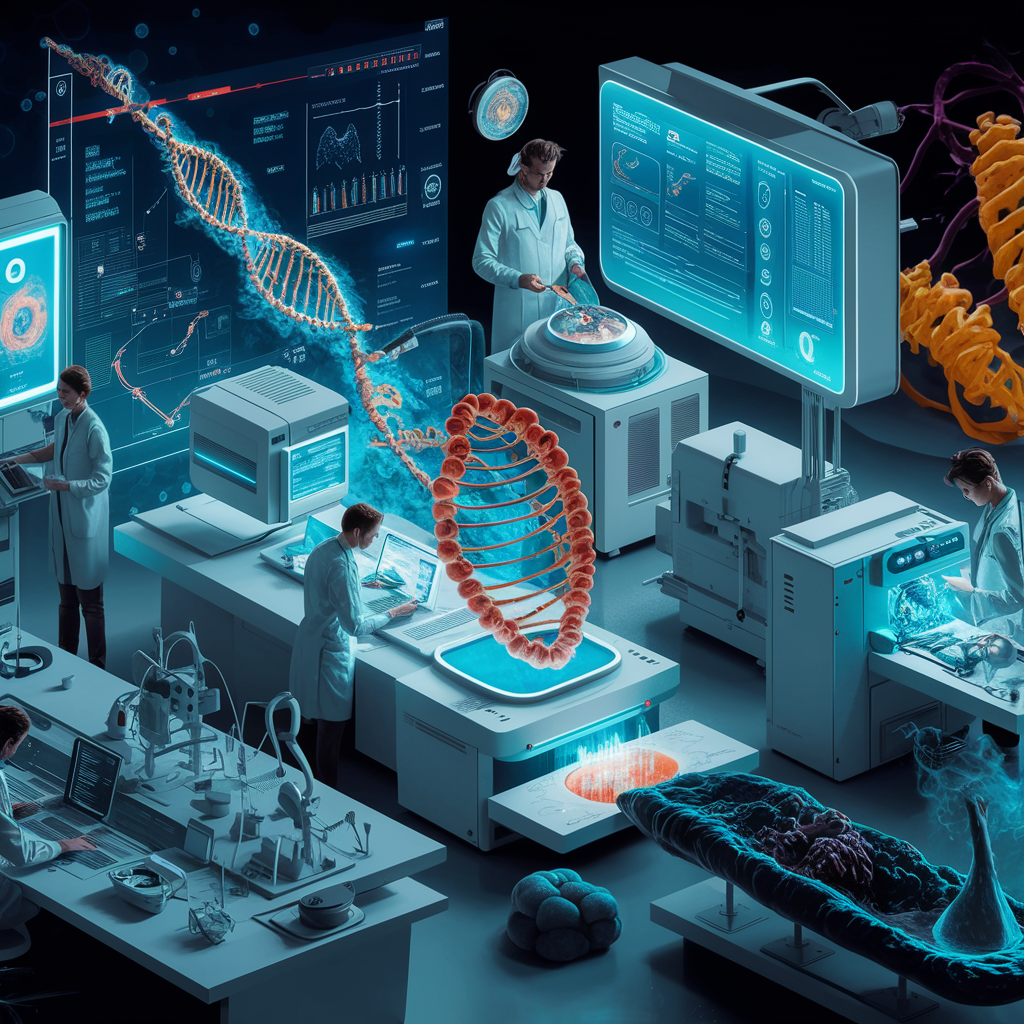Table of Contents
The Future is Now How Modern Genetic Research is Building Bridges to Better Health
Understanding Genetics and Health
Genetics plays a pivotal role in determining our health, influencing everything from susceptibility to certain diseases to the effectiveness of medications. Every individual inherits a unique combination of genes from their parents, which interact with environmental factors to shape their health outcomes.
The Impact of Genetics on Disease
Many conditions, such as heart disease, diabetes, and cancer, have a genetic component. For example, certain mutations in the BRCA1 and BRCA2 genes significantly increase the risk of breast and ovarian cancer. Understanding your genetic predisposition can lead to early intervention and personalized treatment plans, significantly improving outcomes.
Personalized Medicine
The field of pharmacogenomics explores how someone’s genetic makeup affects their response to drugs, leading to the development of personalized medicine. This ensures medications are more effective and reduces the risk of adverse reactions. For instance, individuals with variations in the VKORC1 gene may require different dosages of warfarin, a common blood thinner, to prevent blood clots while minimizing the risk of bleeding.
Lifestyle and Environment
While genetics set the stage, lifestyle and environmental factors play crucial roles in health. A balanced diet, regular exercise, and avoiding harmful substances can mitigate the influence of genetic predispositions. For example, individuals with a family history of heart disease may benefit from a heart-healthy lifestyle to lower their risk.
Understanding genetics in the context of health empowers individuals to make informed decisions about their well-being. It’s a dynamic field, with ongoing research continually shedding light on how our genes affect our health. This knowledge not only improves individual health outcomes but also guides public health strategies to manage genetic diseases more effectively.
In conclusion, genetics provides a foundation upon which our health is built, offering insights that can lead to personalized healthcare strategies. By combining genetic knowledge with a healthy lifestyle, individuals can optimize their health and potentially reduce their risk of genetic diseases.
The Transformative Power of Genetic Research in Disease Prevention
The advent of genetic research has ushered in a new era in the realm of disease prevention, offering unprecedented insight into the genetic underpinnings of various diseases. By unraveling the complexities of our DNA, scientists have been able to identify specific genetic markers that are associated with an increased risk of developing certain conditions, from cardiovascular diseases to various forms of cancer.
Early Detection and Personalized Medicine
One of the most significant impacts of genetic research is its ability to facilitate early detection of diseases. Through genetic screening, individuals can be alerted to their susceptibility to certain diseases long before symptoms appear, enabling proactive measures and lifestyle adjustments that can significantly mitigate risks.
Moreover, genetic research has been pivotal in the development of personalized medicine. Understanding the genetic factors that influence how a disease manifests in an individual has led to tailored treatment strategies that are more effective and come with fewer side effects. For instance, pharmacogenomics, the study of how genes affect a person’s response to drugs, allows for personalized medication plans that maximize therapeutic efficacy while minimizing adverse reactions.
Preemptive Strategies and Public Health
On a broader scale, genetic research has profound implications for public health strategies. By identifying populations at higher genetic risk for certain diseases, healthcare systems can implement targeted prevention programs, such as enhanced screening protocols and educational campaigns about lifestyle choices that can influence disease development.
Furthermore, genetic research is instrumental in the quest for disease eradication. For example, understanding the genetic factors that contribute to infectious disease susceptibility and resistance can guide the development of more effective vaccines and therapeutics, potentially leading to the control, if not eradication, of some of the world’s most challenging infectious diseases.
In conclusion, the impact of genetic research on disease prevention is both transformative and multifaceted. It promises a future where diseases are not only treated more effectively but can be anticipated and prevented before they even occur, heralding a new chapter in the annals of medical science.
Advancements in Genetic Testing and Screening
In recent years, the field of genetic testing and screening has seen remarkable advancements, contributing significantly to the understanding and management of genetic disorders. With the advent of Next-Generation Sequencing (NGS) technologies, scientists and clinicians are now able to explore the genome in unparalleled detail, ushering in an era of precision medicine where treatments can be tailored to the individual’s genetic makeup.
Key Developments include:
- High-Throughput Sequencing: NGS technologies have dramatically increased the speed and reduced the cost of sequencing, making it feasible to sequence large numbers of genomes or targeted regions of the genome efficiently.
- CRISPR-Cas9 Genome Editing: This revolutionary technology has the potential to correct genetic defects by directly editing the DNA sequence, offering hope for the treatment of many genetic disorders.
- Non-Invasive Prenatal Testing (NIPT): Utilizing just a simple blood test from the mother, NIPT can screen for certain genetic conditions in the fetus with remarkable accuracy, without the risks associated with invasive testing methods.
These innovations not only enhance our capacity to detect and diagnose genetic conditions but also open the door to new treatment possibilities. For example, gene therapy, once considered a distant dream, is now a reality for some genetic disorders, thanks to these technological advancements.
As we move forward, the integration of Artificial Intelligence and machine learning with genetic testing promises to further refine our understanding of genetics, improving the predictive power of genetic screening and expanding its application in personalized medicine. This fusion of technology and genetics heralds a future where the prevention and management of genetic disorders are more effective, personalized, and accessible than ever before.
By embracing these advancements, healthcare providers and researchers continue to push the boundaries of what is possible in genetic testing and screening, offering new hope to individuals and families affected by genetic conditions.
Understanding Precision Medicine: A Genomic Approach to Treatment
Precision Medicine represents a transformative approach to healthcare, distinguishing itself by utilizing genetic information to guide the diagnosis and treatment of diseases. Unlike the traditional “one-size-fits-all” strategy, precision medicine tailors medical treatment to the individual characteristics of each patient’s genetic profile. This innovative method holds the promise of optimizing therapeutic effectiveness and minimizing side effects.
Key Components of Precision Medicine:
- Genetic Analysis: At the heart of precision medicine lies the comprehensive analysis of the patient’s genetic makeup. By identifying specific genes or mutations associated with certain diseases, healthcare providers can predict susceptibility to diseases, forecast disease progression, and understand how different bodies might react to medications.
- Tailored Treatments: Leveraging the insights from genetic analysis, treatments can be customized. This means that medications and therapies are selected based on a patient’s genetic predisposition, ensuring higher efficacy rates and reducing the likelihood of adverse reactions.
- Predictive Preventive Measures: Precision medicine not only enhances treatment after disease onset but also contributes to preventive strategies. Understanding genetic risk factors enables earlier interventions and lifestyle adjustments that could delay or prevent the onset of genetic-related diseases.
Benefits of Precision Medicine:
- Increased Efficacy of Treatments: By targeting treatments to specifically match the genetic profile of individuals, precision medicine maximizes the therapeutic benefits.
- Reduced Side Effects: Customized treatment plans reduce the risk of negative side effects, as medications that could cause adverse reactions are avoided.
- Preventive Healthcare: With the ability to identify genetic risks, precision medicine empowers patients and doctors to take preemptive measures against potential health issues.
Challenges and the Future:
Despite its potential, precision medicine faces challenges such as high costs, ethical considerations around genetic privacy, and the need for more comprehensive databases to accurately interpret genetic variations across diverse populations. However, ongoing research and technological advancements continue to address these challenges, paving the way for more accessible and effective precision medicine initiatives.
In conclusion, precision medicine stands at the forefront of a healthcare revolution, offering a more personalized approach to treatment by harnessing the power of genetic information. As we move forward, the integration of genetics into medical practice promises to transform patient care, making treatments more effective, safer, and tailored to the unique genetic makeup of each individual.

Ethical Considerations in Genetic Research
The realm of genetic research stands at the forefront of modern science, heralding groundbreaking therapies and unparalleled insights into human biology. However, this pioneering field is also fraught with ethical dilemmas that warrant careful consideration. Ethical considerations in genetic research encompass a broad spectrum of issues, ranging from consent to the potential impact on future generations.
Privacy and Confidentiality: At the heart of genetic research ethics is the concern for participant privacy and the confidentiality of genetic information. Given the deeply personal nature of genetic data, safeguarding this information is paramount. Researchers must ensure that genetic information is not only secure but also handled in a manner that respects individual privacy.
Informed Consent: The principle of informed consent is a cornerstone of ethical research. Participants must be fully aware of the nature of the research, including any potential risks and benefits. For genetic studies, this includes discussions about how genetic data will be used, shared, and stored. The consent process must be thorough and understandable, ensuring that participants are genuinely informed.
Fairness and Equity: Genetic research should strive to be inclusive and equitable, avoiding biases that could skew results or perpetuate inequalities. Historically underrepresented groups should be adequately represented, ensuring that the benefits of genetic research are accessible to all, irrespective of ethnicity, socioeconomic status, or geography.
Implications for Future Generations: Genetic interventions, particularly germline editing, raise significant ethical questions about the rights and welfare of future generations. The potential for unforeseen consequences necessitates a cautious approach, underpinned by a commitment to do no harm.
Potential for Discrimination: The possibility that genetic information could be used to discriminate against individuals or groups is a pressing ethical concern. Policies and regulations need to be in place to prevent genetic discrimination by employers, insurance companies, and others.
In conclusion, ethical considerations in genetic research are as complex as the science itself. Navigating these challenges requires a multidisciplinary approach, incorporating insights from bioethics, law, and social sciences. As we advance into uncharted genetic frontiers, upholding ethical principles ensures that progress serves the greater good, respecting individual rights and promoting social justice.
The Role of Genetics in Public Health Initiatives
The intersection of genetics and public health is a rapidly evolving field, fundamentally transforming how we approach disease prevention, diagnosis, and treatment. The integration of genetic information into public health initiatives offers unprecedented opportunities for improving health outcomes and reducing disparities. Genetic information, when accurately interpreted and applied, can inform targeted interventions, enhance disease surveillance, and guide resource allocation more effectively.
One pivotal area where genetics plays a crucial role is in the identification of individuals at high risk for certain genetic diseases. Through genetic screenings and tests, public health practitioners can identify susceptible populations and provide interventions early, potentially reducing the disease burden considerably. For instance, newborn screening programs have been instrumental in identifying genetic conditions early in life, enabling immediate treatment to prevent severe health issues or even death.
Moreover, genetics also aids in understanding the population’s susceptibility to infectious diseases and the effectiveness of vaccines, shaping vaccination strategies. This is particularly pertinent in the context of personalized medicine, where genetic variations influence the response to drugs, including vaccines.
Public health genomics, a discipline merging genetics with public health strategies, emphasizes the importance of using genetic information responsibly and ethically. As we navigate the complexities of genetic data, considerations surrounding privacy, consent, and the potential for genetic discrimination must be addressed to ensure equitable health outcomes.
In summary, the role of genetics in public health initiatives is multifaceted, offering the potential to enhance disease prevention, tailor treatments, and improve health equity. By leveraging genetic insights, public health can advance towards a more personalized and effective approach to health care and disease prevention, marking a new era in public health management.
Genetic Research: Past, Present, and Future
Genetic research, a cornerstone of modern science, has seen a remarkable evolution over the decades. Its journey from the discovery of DNA to the present day’s cutting-edge gene-editing technologies underscores a saga of rapid advancement and innovative breakthroughs.
Historically, the field took its first monumental step with Gregor Mendel’s experiments on pea plants in the mid-19th century, laying the groundwork for the laws of inheritance. However, the true molecular era began with James Watson and Francis Crick’s description of the DNA double helix in 1953. This iconic discovery paved the way for developing recombinant DNA technology in the 1970s, which allowed genes to be cloned and manipulated outside their natural environment, heralding the age of genetic engineering.
In the present day, genetic research thrives at the intersection of technology and biology. The introduction of CRISPR-Cas9, a gene-editing tool, has been revolutionary, offering precision, efficiency, and accessibility in modifying organisms’ genomes. Alongside, the completion of the Human Genome Project in 2003 provided an unprecedented map of human genes, facilitating advances in understanding genetic diseases, personalized medicine, and ancestral tracing.
Looking to the future, genetic research promises to deliver innovations that could radically transform healthcare and environmental management. Anticipated advancements include the development of more refined gene therapies for complex diseases such as cancer and Alzheimer’s, genetically modified crops to address food security, and even the potential for reversing genetic diseases before birth. Furthermore, ethical considerations and public engagement will play crucial roles in shaping how society harnesses the power of genetic research, ensuring that its benefits are equitably distributed.
Genetic research stands as a beacon of human curiosity and ingenuity, its past rich with discovery, its present burgeoning with possibility, and its future bright with the promise of improving the human condition in profound ways.
The Intersection of Genetics and Technology in Healthcare
The fusion of genetics and technology in healthcare represents one of the most groundbreaking advancements in medical history. At this juncture, precision medicine – a personalized healthcare strategy that considers genetic, environmental, and lifestyle factors – is dramatically transforming patient care. Through the innovative use of gene sequencing technologies, medical professionals can now identify genetic mutations responsible for diseases, enabling the development of tailored treatments and interventions.
Genetic Testing has become a cornerstone in diagnosing and managing inherited conditions. Technologies such as CRISPR-Cas9 for gene editing not only hold the promise for correcting genetic defects but also open new avenues in treatment modalities for a range of diseases, including cancer and genetic disorders. Moreover, the integration of big data analytics in genomics can sift through vast amounts of genetic information to uncover patterns and predictors of disease, enhancing the predictive capability of healthcare providers.
Furthermore, the application of AI and machine learning in interpreting genetic data accelerates the pace at which personalized treatment plans are devised, making them more accessible to patients worldwide. This synergy between genetics and technology has not only improved diagnostic accuracy but has paved the way for preventive healthcare measures, significantly reducing the incidence of genetic diseases.
As we move forward, the continued exploration and investment in this intersection promise to unlock even more potent and cost-effective healthcare solutions, ushering in a new era where medicine is as unique as the DNA of each patient. The potential of this collaboration is immense, heralding a future where genetic diseases are no longer a determinant of one’s destiny, thanks to the profound impact of technology in genetics.


You must be logged in to post a comment.